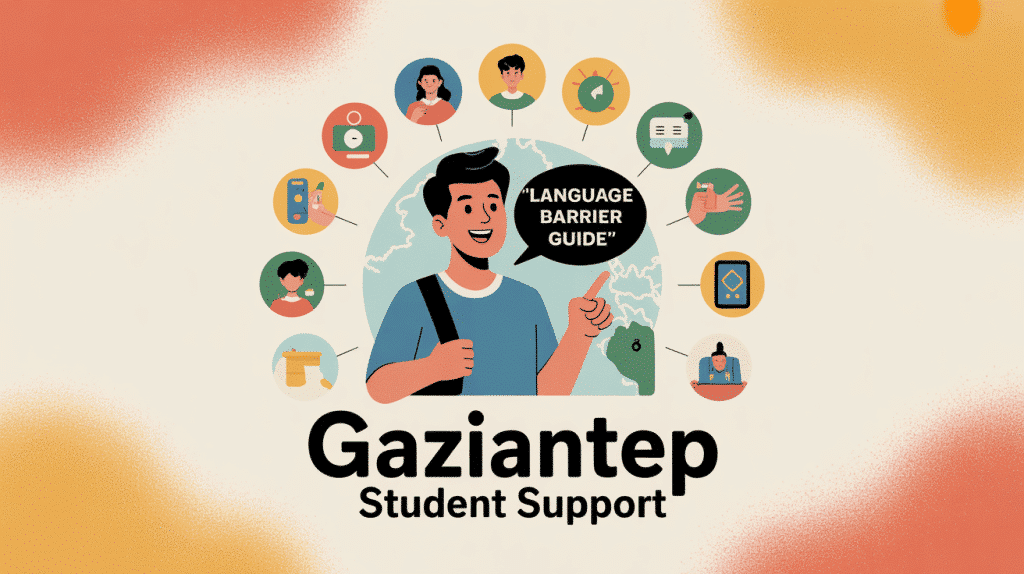Language Barrier Guide for Students in Gaziantep
Understanding the Language Landscape in Gaziantep
Gaziantep is an industrial hub in southern Turkiye, located near the Syrian border. Its population includes a significant number of international students, particularly those from Syria, whose native language is Arabic. The city’s unique position has shaped both its cultural and linguistic environment, resulting in a blend of Turkish and Arabic influences. This diversity can offer a rich educational experience; however, it also poses certain challenges, particularly regarding language proficiency for non-Turkish speakers.
Common Challenges Faced by International Students
- Limited Turkish Proficiency: Many international students, especially newcomers, may struggle to fully participate in classes, social activities, and everyday life due to inadequate Turkish language skills. This barrier can affect their overall university experience and academic performance.
- Access to Arabic Instruction: For Syrian students, the suspension of Arabic-language programs at Gaziantep University in 2020 significantly restricted their higher education options. Although Turkish is the primary language of instruction, some Arabic-language programs have since been reintroduced to address these challenges.
- Integration Barriers: Language difficulties can impact students’ ability to integrate socially and academically, sometimes leading to feelings of isolation or exclusion. The inability to communicate effectively can hinder not just academic success but also social interactions.
- Varying Levels of Support: The level of language support varies across educational institutions. Some universities provide extensive resources for non-Turkish speakers, while others may have limited infrastructure for language support, affecting students’ adaptation processes.
Solutions and Support Mechanisms
- Arabic Language Programs: Gaziantep University has reinstated Arabic-language instruction for specific disciplines like Business Administration, Sharia Law, and Elementary Education. This initiative is particularly beneficial for Syrian students and aims to alleviate the challenges they face.
- Transitional Support: Community centers and organizations in Gaziantep offer informal support, such as language classes, integration activities, and opportunities to maintain mother-tongue skills while learning Turkish. Creating an environment where students can practice both languages can foster quicker adaptation.
- Social and Cultural Similarities: Gaziantep shares numerous cultural practices, foods, and architectural features with Syrian cities like Aleppo. These cultural similarities can help students feel more at home and ease the adaptation process, despite the language barrier.
Tips for Overcoming Language Barriers
- Utilize Bilingual Resources: Seek out courses or materials available in both Turkish and Arabic. Many academic institutions offer resources that cater to bilingual students, which can be incredibly helpful, especially during the initial adaptation phase.
- Engage in Language Exchange: Participate in social activities and language exchange programs offered on and off-campus. Such programs not only provide an avenue to practice Turkish but also allow for interpersonal connections with local students.
- Seek Academic Support: Make use of university services or student affairs departments that offer tutoring, counseling, and guidance in multiple languages. Many Turkish institutions, including Gaziantep University, have resources to support international students.
- Stay Connected with Peers: Build networks with both local and international students. Peer interactions are critical for gaining academic and emotional support, particularly when navigating a new language and culture.
- Maintain Mother Tongue Proficiency: While prioritizing Turkish language skills is crucial, it is equally important to maintain proficiency in your native language. This balance will help reinforce your academic identity and personal well-being.
University and Community Initiatives
Educational institutions in Gaziantep, such as Gaziantep University, along with local organizations, continue to adapt their policies and introduce new programs to support students facing language barriers. For example, they are enhancing their frameworks for Arabic language instruction and expanding extracurricular activities that promote language proficiency and cultural exchange.
These ongoing efforts are intended to foster greater inclusion and educational access for all international students in the city, creating a supportive environment that celebrates linguistic diversity.
Gaziantep’s unique cultural and linguistic landscape, combined with increasing institutional support, offers international students both challenges and opportunities as they navigate language barriers in their educational journey.
For more information on universities in Gaziantep, language preparation programs, and student support services, visit the Study in Turkiye platform’s dedicated university and student life sections.
Final Thoughts
Successfully navigating language barriers is crucial for international students in Gaziantep. With rising support mechanisms from universities and local communities, students can overcome these challenges, enhancing their academic experiences and cultural integrations. If you’re an agency or educational institution looking to support international students, consider establishing partnerships with platforms like Study in Turkiye to contribute to a more inclusive education environment.
For tailored advice on admissions procedures, language resources, and support systems within Turkiye, visit our dedicated pages:
Take the Next Step with Study in Turkiye
Explore further to enhance your educational journey in Turkiye.

